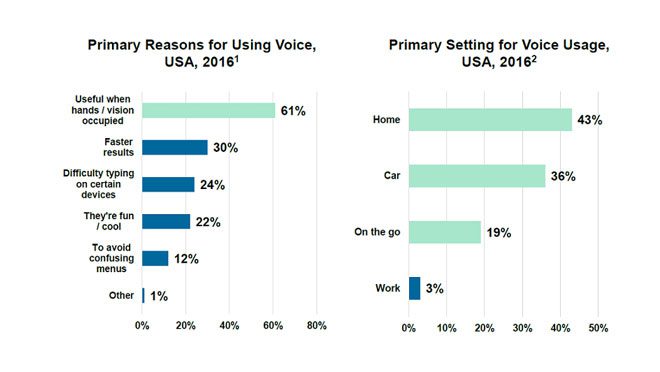7 Proven Ways on How Voice Search Can Improve SEO
Voice Searching has become increasingly popular as more and more of us take to our vast range of technological devices to browse the internet and find information with ease.
But what is Voice Searching? Why has it seen such rapid growth recently? And how does it impact SEO? We investigate.
What is Voice Searching?
Voice Searching is a method of searching for information by talking to a digital assistant on your phone or computer – that has been downloaded from an app store or comes built-in – to acquire the relevant information or to complete a command.
Two Examples of Voice Searching Include:
Google Voice Search – also known as Search by Voice – is a product produced by Google that allows users to use Google Search by speaking – instead of typing – on a mobile phone or computer.
Siri, who was brought out by Apple in 2013. Three years ago, however, it didn’t seem to make much of an impact, as people would enamored by Siri’s charm for a week or so, and then the popularity would slowly fade away.
The variety of digital assistants available today has grown extensively, with Siri, Cortana, Alexa, Google Assistant, and Google Now being the most popular and well-known options available from major technology companies.
A search on any app store will display many more options, with an astonishing variety from a number of other companies trying to compete and keep up with their more famous counterparts.
Today, that has changed drastically, with voice gaining popularity like never before. But why?

How Voice Search Shapes SEO Strategies and Website Rankings
In the ever-evolving landscape of search engine optimization (SEO), the rise of voice has been a game-changer. As we delve into 2024, it’s imperative to reassess how this technology continues to shape SEO strategies and website rankings.
Now that more and more people are using voice options to conduct online searches, there is a need for marketers to change their approach to SEO.
Voice Search gives users the opportunity to be more specific with their search, allowing them to go from simple queries they would normally search into the search box – “local Chinese restaurant” – to using lengthier searches – “the best local Chinese restaurant known for their Chow Mein” – that will bring up more specific results.
Enhanced Search Adoption
According to a recent study by Voicebot.ai, voice assistant usage has surged by 32% globally in the past year alone. This indicates a significant uptick in the adoption of voice search technology. With more consumers embracing voice assistants like Amazon Alexa, Google Assistant, and Apple Siri, optimizing for voice search has become paramount for businesses. Source: (Voicebot.ai)
Localized Voice Queries on the Rise
Recent data from Demand Sage reveals that there are 4.2 billion voice assistants in use, and this number will reach 8.4 billion by the end of 2024. This underscores the importance of optimizing for localized keywords and ensuring that business information is accurate and consistent across online directories. Neglecting local SEO could result in missed opportunities for businesses to capture local market share.
Conversational Content is King
As voice search becomes more conversational, the demand for natural language content continues to grow. According to a study by Semrush, 62% of Americans use voice assistants and 36% are smart speaker owners. This underscores the need for website content that mirrors the way people speak, focusing on long-tail keywords and addressing specific user queries in a conversational tone.
Featured Snippets Dominate Voice Search Results
Research conducted by Moz indicates that over 40% of voice search answers are sourced from featured snippets. This highlights the importance of optimizing content to appear in these coveted position zero spots. By structuring content in a concise and informative manner, websites can increase their chances of being selected as the voice search answer.
Voice Commerce is on the Rise
With the proliferation of smart home devices and voice-enabled shopping experiences, voice commerce is gaining momentum. A report by OC&C Strategy Consultants predicts that voice shopping will reach $80 billion in the US by 2024, representing a significant opportunity for businesses to capitalize on this emerging trend. Optimizing product listings and providing seamless voice-enabled checkout experiences will be key to success in the voice commerce arena.
Reason Behind Voice Search’s Growth
Business.com quoted someone saying that “using voice responsive products is poised to be the next thing to be a daily habit since the smartphone,” and they couldn’t be more spot on.
Voice Searching has become so much more than an easier way to search for information, as digital assistants can do so much more than just that, all from wearable devices (for example, Apple Watches), tablets, and mobile phones.
What’s more, Voice Searching has been shown to be more popular now because it is convenient and saves time. The graph below, taken from Search Engine Land, shows the top reasons that users turn to Voice Searching in the US, with the top reason being when their hands or vision is occupied.

Conclusion
The impact of voice search on SEO continues to evolve rapidly in 2024. With increased adoption, localized queries, and the growing importance of conversational content, businesses must adapt their SEO strategies to stay ahead in the ever-changing digital landscape.
By leveraging the latest data and insights, businesses can optimize their online presence to capture the opportunities presented by voice search and drive organic traffic to their websites.


